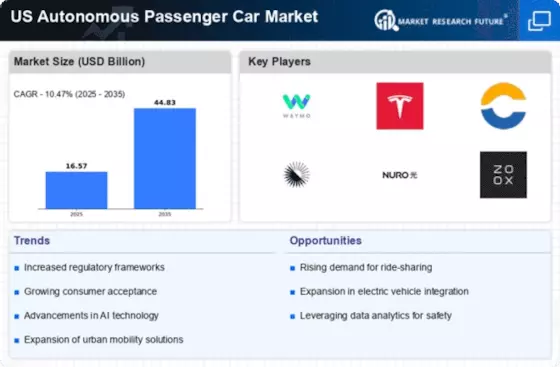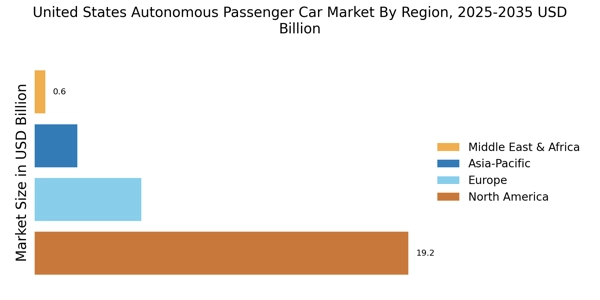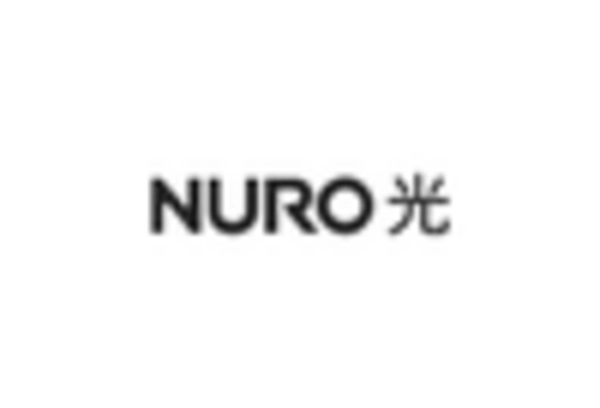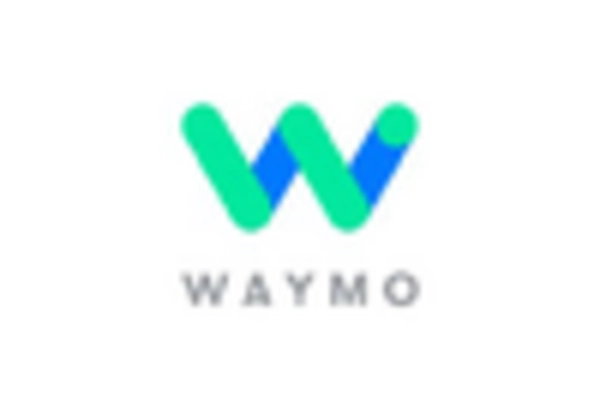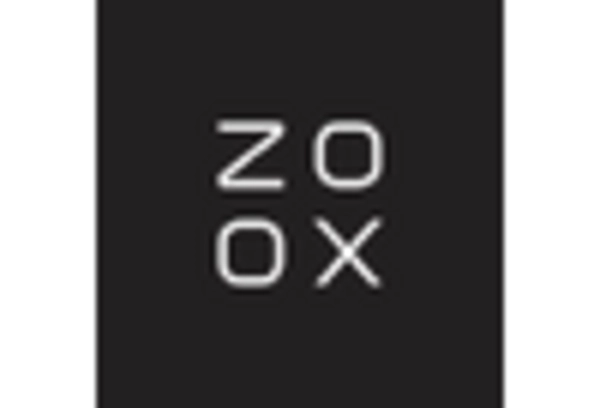Regulatory Support
Regulatory support plays a crucial role in the growth of the US Autonomous Passenger Car Market. Federal and state governments are actively developing frameworks to facilitate the testing and deployment of autonomous vehicles. The National Highway Traffic Safety Administration (NHTSA) has issued guidelines that encourage innovation while ensuring safety standards are met. In 2025, several states have enacted laws that allow for the operation of fully autonomous vehicles without a human driver present. This regulatory environment is expected to foster investment and innovation, as companies can operate with greater certainty regarding compliance. Moreover, the establishment of dedicated testing zones and pilot programs is likely to accelerate the development of autonomous technologies, further enhancing the market's growth potential.
Consumer Demand for Safety
Consumer demand for enhanced safety features is a significant driver in the US Autonomous Passenger Car Market. As road safety remains a paramount concern, autonomous vehicles are perceived as a solution to reduce accidents caused by human error. Data from the National Highway Traffic Safety Administration indicates that over 90 percent of traffic accidents are attributed to human mistakes. Consequently, consumers are increasingly inclined to adopt autonomous vehicles that promise improved safety through advanced technologies such as automatic braking, lane-keeping assistance, and collision avoidance systems. This growing awareness and demand for safer transportation options are likely to propel the market forward, as manufacturers respond by integrating these features into their autonomous offerings.
Technological Advancements
The US Autonomous Passenger Car Market is experiencing rapid technological advancements that are reshaping the landscape of personal transportation. Innovations in artificial intelligence, machine learning, and sensor technologies are enhancing the capabilities of autonomous vehicles. For instance, companies like Waymo and Tesla are leading the charge with their advanced driver-assistance systems, which are becoming increasingly sophisticated. According to recent data, the market for autonomous vehicles is projected to reach USD 60 billion by 2030, driven by these technological improvements. Furthermore, the integration of 5G technology is expected to facilitate real-time data exchange, improving vehicle-to-everything (V2X) communication. This technological evolution not only enhances safety but also boosts consumer confidence in autonomous vehicles, thereby propelling the US Autonomous Passenger Car Market forward.
Investment and Partnerships
Investment and partnerships are critical drivers in the US Autonomous Passenger Car Market. The landscape is characterized by significant financial backing from both private and public sectors, with venture capital flowing into startups focused on autonomous technologies. Major automotive manufacturers are also forming strategic alliances with tech companies to leverage expertise in AI and software development. For example, partnerships between traditional automakers and tech giants are becoming increasingly common, facilitating the sharing of resources and knowledge. In 2025, investments in autonomous vehicle technology are projected to exceed USD 30 billion, reflecting the high level of confidence in the market's future. This influx of capital is likely to accelerate innovation and bring new autonomous solutions to market, further driving the industry's growth.
Environmental Sustainability
The push for environmental sustainability is becoming a pivotal driver in the US Autonomous Passenger Car Market. As concerns about climate change intensify, there is a growing emphasis on reducing carbon emissions from the transportation sector. Autonomous electric vehicles (EVs) are emerging as a viable solution, combining the benefits of automation with zero-emission technology. The US government has set ambitious targets to increase the adoption of EVs, aiming for 50 percent of new vehicle sales to be electric by 2030. This regulatory push, coupled with consumer preferences shifting towards greener alternatives, is likely to stimulate the growth of the autonomous EV segment. Consequently, manufacturers are investing heavily in research and development to create sustainable autonomous vehicles that align with these environmental goals.


